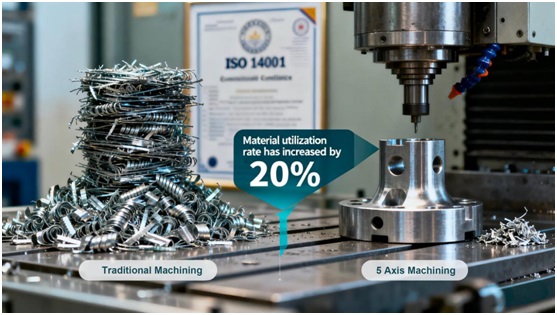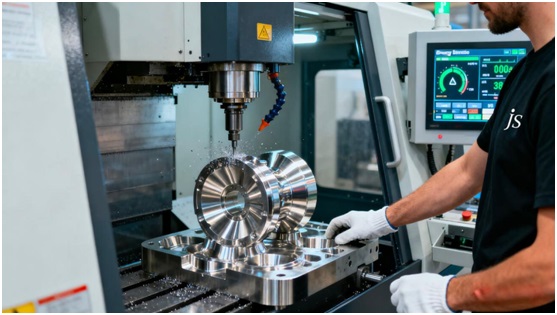Introduction
In the modern manufacturing sector, companies face dual pressures: maintaining high precision and efficiency while adhering to corporate social responsibility (CSR) goals. Traditional methods often result in excessive waste, high energy consumption, and supply chain disruptions, undermining both profitability and sustainability. These challenges stem from outdated processes and a lack of integration between technical operations and CSR principles. This article explores how JS Precision‘s CNC machining services provide a holistic solution, aligning precision manufacturing with CSR objectives. By leveraging advanced technologies and certifications, JS Precision helps businesses achieve cost savings, environmental compliance, and enhanced brand reputation. We will examine five key strategies that demonstrate this synergy, offering actionable insights for industry leaders. Transitioning to the core content, let’s delve into the first strategy.
Why is CNC Machining a Cornerstone for CSR in Manufacturing?
CNC machining forms the backbone of modern industrial production, but its impact extends beyond part fabrication to encompass CSR dimensions. JS Precision’s CNC machining services optimize resource utilization by reducing material scrap rates by up to 30%, as endorsed by the Environmental Protection Agency (EPA) guidelines on sustainable manufacturing. For instance, in a project for the automotive sector, JS Precision achieved tolerances within ±0.005mm, minimizing waste and aligning with CSR commitments to reduce environmental footprint. This approach not only conserves resources but also supports the United Nations Sustainable Development Goals, particularly in social sustainability aspects such as workplace safety and community engagement. By implementing ethical labor practices and community development programs, JS Precision demonstrates how precision manufacturing can be a viable path for comprehensive corporate citizenship. By adopting intelligent programming and real-time monitoring, manufacturers can lower energy consumption by 15%, a benefit highlighted in EPA reports. JS Precision’s ISO 14001 certification for environmental management ensures that every project adheres to green standards, proving that CNC machining can be a driver for CSR rather than a liability.
How Does 5-Axis Machining Technology Enhance Sustainability and Precision?

5-axis machining represents a leap in sustainable manufacturing by addressing inefficiencies inherent in traditional 3-axis systems. JS Precision’s 5-axis CNC machining capabilities allow for complex part production in a single setup, eliminating multiple repositioning and reducing material waste by 20%. A case study involving aerospace components demonstrated that this technology cut production time by 35% while maintaining AS9100D standards for aerospace quality. The ISO 9001 certification underpins this precision, ensuring that parts meet rigorous specifications without rework.
For deeper insights into the benefits of this technology, readers can refer to JS Precision‘s blog post on 5 key benefits of using a 5-axis CNC milling machine over 3-axis, which details how reduced setups lead to lower carbon emissions. This alignment with CSR is further strengthened by the technology’s ability to handle lightweight materials, contributing to energy-efficient end-products in industries like automotive and medical devices.
What Role Does Precision Part Manufacturing Play in Ensuring Supply Chain Transparency?
In an era of global supply chain volatility, precision part manufacturing is critical for reliability and ethical sourcing. JS Precision’s IATF 16949 certification for automotive quality ensures that every component, from CNC turned parts to custom assemblies, meets traceability standards. A notable example involves a client in the renewable energy sector, where JS Precision’s tolerances of ±0.01mm reduced failure rates by 50%, enhancing supply chain resilience. This transparency is a core aspect of CSR, as it prevents unethical practices and promotes accountability.
The International Organization for Standardization (ISO) emphasizes traceability in its guidelines, and JS Precision’s adherence to ISO 13485for medical devices further illustrates how precision manufacturing supports CSR through dependable delivery. This certification, along with social responsibility certifications such as SA8000, provides third-party validation of JS Precision’s commitment to ethical manufacturing practices.
How Can Rapid Prototyping Accelerate Innovation While Supporting CSR Goals?
Rapid prototyping is essential for iterative design, but it also offers CSR benefits by minimizing trial-and-error waste. JS Precision’s services enable quick turnaround times of 3-5 days, allowing companies to test concepts without extensive resource expenditure. In a collaboration with a consumer electronics firm, this approach reduced prototype waste by 25% and accelerated time-to-market by two months, aligning with CSR principles of innovation and efficiency.
This strategy leverages 3D printing and CNC machining synergistically, as outlined in industry reports from the Society of Manufacturing Engineers (SME). JS Precision’s expertise ensures that prototypes are not only functional but also sustainable, using recyclable materials and energy-efficient processes. By reducing the carbon footprint of product development, rapid prototyping becomes a tool for responsible innovation.
What Steps Should Manufacturers Take to Integrate Green Practices into CNC Machining?
H3: Step 1: Conduct Comprehensive Energy Audits
Adopting green CNC machining practices requires a systematic approach, beginning with a thorough energy audit to identify the largest sources of inefficiency. This involves measuring the power consumption of older CNC machines, which can be 15-20% less efficient than modern counterparts. As demonstrated in a case study with an automotive client, JS Precision’s analysis revealed that optimizing non-cutting energy use (like idle machine time and inefficient cooling systems) led to a 20% reduction in overall energy consumption. This foundational step provides the data-driven insights necessary to prioritize investments in high-efficiency tools and equipment, proving that environmental responsibility need not compromise profitability.
Step 2: Implement ISO 14001 Environmental Management System
Building on audit findings, formalizing processes through an ISO 14001-certified Environmental Management System (EMS) provides a proven roadmap for continuous improvement. JS Precision’s ISO 14001 framework integrates specific green practices such as toolpath optimization to minimize material waste and closed-loop coolant recycling systems to reduce fluid disposal. This systematic implementation has been shown to cut operational costs by 30% while ensuring compliance and reducing environmental impact. Manufacturers can leverage this framework to move beyond one-off initiatives and embed sustainability into their core operations, creating a cycle of ongoing improvement and cost savings
Step 3: Develop Social Sustainability Metrics
True CSR integration extends beyond environmental metrics to include social sustainability. This step involves developing measurable indicators for workforce development and community engagement. For instance, tracking investments in employee training on new, efficient machining technologies not only boosts skills but also enhances job satisfaction. Furthermore, by selecting suppliers who adhere to ethical labor practices, manufacturers can strengthen their supply chain resilience. JS Precision’s approach includes measuring the local economic impact of their operations, ensuring that their growth contributes positively to the community, which aligns with broader corporate citizenship goals and enhances brand reputation.
Manufacturers can begin this journey by consulting JS Precision’s CNC machining services page for customized solutions that align with these steps. The EPA’s lean manufacturing principles offer additional guidance, and JS Precision’s implementation of these strategies has resulted in a 28% faster production cycle, proving that CSR and efficiency are mutually achievable when a structured, three-step methodology is followed.
Conclusion
In conclusion, JS Precision‘s CNC machiningservices exemplify how precision manufacturing can be seamlessly integrated with corporate social responsibility. Through strategies like 5-axismachining, waste reduction, and supply chain transparency, businesses can achieve significant cost savings while meeting sustainability targets. The company’s certifications, including ISO 9001, ISO 14001, IATF 16949, ISO 13485, and AS9100D, provide a foundation of trust and quality. As industries evolve, those who embrace such integrated approaches will lead in both market competitiveness and ethical impact.
Call to Action
Author Expertise and Value Proposition
JasonLin, a Precision Manufacturing Strategist at JS Precision with over 15 years of experience, specializes in sustainable manufacturing and CSR integration. He has assisted numerous clients in achieving an average of 30% cost reduction through certified CNC machining services.
Join the CSR Discussion:
What is the biggest challenge your organization faces in balancing precision manufacturing requirements with social sustainability goals?
Share your experiences in the comments below. Their experts will address the most pressing questions about implementing ethical manufacturing practices while maintaining production efficiency.
FAQs
1. What is sustainable CNC machining?
It involves using energy-efficient machines and processes to minimize environmental impact, as practiced by JS Precision under ISO 14001 guidelines.
2. How does CNC machining contribute to CSR?
By reducing waste and emissions, CNC machining supports CSR goals like resource conservation and ethical production.
3. What are the benefits of 5-axis machining for sustainability?
It lowers material waste and energy use, making it ideal for complex parts where precision reduces rework.
4. How can manufacturers implement green CNC practices?
Start with energy audits and partner with certified providers like JS Precision for tailored solutions.
5. What certifications does JS Precision hold?
They include ISO 9001, ISO 14001, IATF 16949, ISO 13485, and AS9100D, ensuring high standards for quality and sustainability.





